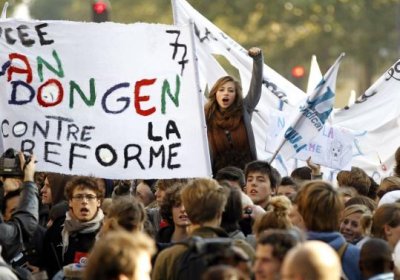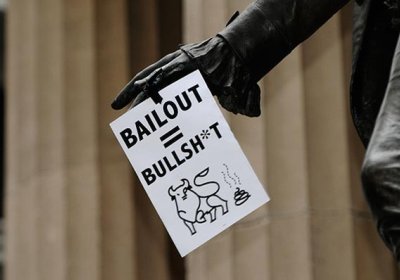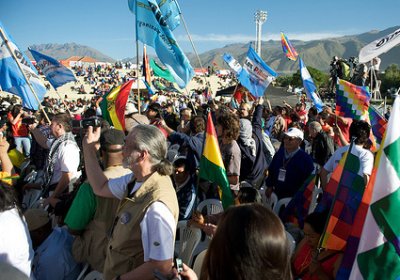Workers and students mobilised in their millions on October 12 in the fourth and largest day of action in the past month against laws that will reduce workers’ pension entitlements.
The protests and strikes came as the Senate passed aspects of the pension bill that will see an increase in the retirement age from 60 to 62 years of age and increase the period of time workers must work to receive a full pension.
The protests show growing polarisation over who should pay the price for the economic crisis in the lead up to national strikes on October 16 and 19.
857
The Australian dollar has become a favourite for international currency speculators. Fuelled by expectations of rising interest rates, the A$ has increased in value from US$0.82 in June, to almost $0.98 on October 12.
Some expect the $A could surpass the value of the US$ in coming weeks.
The following call was issued by Canadian-based non-government organisations, community groups and individuals to join the growing global movement for climate justice. It calls for mobilising in the lead-up and during the United Nations climate summit in Cancun, Mexico, over November 27-December 10.
About 40 people attended the launch of a No New Coal campaign by Safe Climate Perth on October 10. The launch took place as part of the 350.org “global work party” — an international day of action involving more than 7000 events around the world.
As part of the campaign, activists aim to get 10,000 signatures in 10 weeks on a petition opposing new coal developments in Western Australian.
Coasting on the back of environmental protests and a hemorrhaging two-party system, the German Greens have sent shock waves through German politics, surging into the position of main opposition party for the first time.
The Greens, who were part of a coalition government with the Social Democratic Party (SPD) from 1998-2005 at the expense of many of the party’s principles, are benefiting from the unraveling of Germany’s traditional two-party system.
BP abolishes safety ombudsman
“BP is disbanding the external safety ombudsman it set up after a fatal explosion at a company refinery in Texas in 2005 despite a growing number of concerns raised by the oil company’s employees.
“More than half the issues raised since the office was established in 2006 relate to BP’s operations in Alaska.
“BP said it would not extend the office’s tenure beyond June.
“The move comes less than a fortnight after the company announced it was setting up a new internal safety function, led by its head of safety and operations, Mark Bly.
On his TV show Alo Presidente on October 3, Venezuela’s President Hugo Chavez drove tractors and inspected corn crops as he pledged to accelerate land reform and increase the government’s share of food production and distribution.
Chavez announced the nationalisation of the agricultural supplies company Agroislena and the Venezuelan properties of the British Vestey Group.
The show took place in Guarico state, where Chavez’s United Socialist Party of Venezuela (PSUV) won most of the state seats in the September 26 National Assembly elections.
The rescue of 33 miners in Chile on October 14 is an extraordinary drama filled with pathos and heroism. It is also a media windfall for the Chilean government, whose every beneficence is recorded by a forest of cameras.
One cannot fail to be impressed. However, like all great media events, it is a facade.
The accident that trapped the miners is not unusual in Chile and the inevitable consequence of a ruthless economic system that has barely changed since the dictatorship of General Augusto Pinochet.
Factory workers from the Venezuelan chemical and lubricant company Veneco held a demonstration on the evening of October 10 in Carabobo state to show their support for the company’s nationalisation.
President Hugo Chavez announced the nationalisation that afternoon.
Jose Martinez, the general secretary of the Venoco workers’ union, said: “We are endorsing this takeover that will bring us many benefits.
“It will bring a change from the capitalist mode to the socialist mode and we are going to strengthen our company.”
In the aftermath of a failed coup attempt on September 30, left-wing Ecuadorian President Rafael Correa has vowed to deepen his “citizen’s revolution” in the small Andean country.
After the coup attempt by sections of the police and armed forces failed amid pro-government protests, Correa’s approval rate has surged to 75% in some polls.
In response, Correa, said his government had not done enough to implement its pro-people program and would radicalise its project to build a “socialism of the 21st century”.
The deluge of rain hitting south-east Australia has broken the 10-year drought that brought the Murray Darling Basin and many farming communities to the brink of disaster.
A few months of wet weather have brought the wetlands back to life. The rivers are flowing again, and farmers might even be able to harvest a bumper crop if they can beat the mass locust hatchings.
The following statement was released by the Socialist Alliance on October 8.
* * *
On October 17, 2001, the Liberal/National Coalition government of John Howard deployed Australian troops to Afghanistan, just nine days after the US had begun bombing one of the most poverty-stricken and war-weary nations on Earth.
The then newly-formed Socialist Alliance responded to this attack and its reputed catalyst, the 9/11 terrorist attacks on New York and Washington, by noting the US' hypocrisy and pledging to campaign against then president George W. Bush's “war without end”.
- Previous page
- Page 2
- Next page











